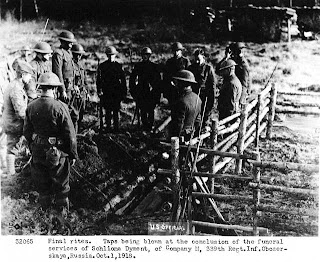 |
| In 1918, President Woodrow Wilson sent 5,500 American soldiers to northern Russia in the last days of World War I. |
"It was dusk. Lev Peshkov waited, shivering, in a freight yard in Vladivostok, the ass end of the Trans-Siberian Railway. He wore an army greatcoat over his lieutenant’s uniform, but Siberia was the coldest place he had ever been.
He was furious to be in Russia. He had been lucky to escape, four years ago, and even luckier to marry into a wealthy American family. And now he was back—all because of a girl. What’s wrong with me? he asked himself. Why can’t I be satisfied?
A gate opened, and a cart drawn by a mule came out of the supply dump. Lev jumped onto the seat beside the British soldier who was driving it. “Aye, aye, Sid,” said Lev.
“Wotcher,” said Sid. He was a thin man of about forty with a perpetual cigarette and a prematurely lined face. A Cockney, he spoke English with an accent quite different from that of South Wales or upstate New York. At first Lev had found him hard to understand.
“Have you got the whisky?”
“Nah, just tins of cocoa.”
Lev turned around, leaned into the cart, and pulled back a corner of the tarpaulin. He was almost certain Sid was joking. He saw a cardboard box marked: “Fry’s Chocolate and Cocoa.” He said: “Not much demand for that among the Cossacks.”
“Look underneath.”
Lev moved the box aside and saw a different legend: “Teacher’s Highland Cream—Perfection of Old Scotch Whisky.” He said: “How many?”
“Twelve cases.”
He covered the box. “Better than cocoa.”
“This is the best whisky in the world,” Lev said in Russian. “It comes from a cold country, like Siberia, where the water in the mountain streams is pure melted snow. What a pity it is so expensive.”
Sotnik’s face was expressionless. “How much?”
Lev was not going to let him reopen the bargaining. “The price you agreed to yesterday,” he said. “Payable in gold rubles, nothing else.”
“How many bottles?”
“One hundred and forty-four.”
“Where are they?”
“Nearby.”
“You should be careful. There are thieves in the neighborhood.”
This might have been a warning or a threat: Lev guessed the ambiguity was intentional. “I know about thieves,” he said. “I’m one of them.”
Sotnik looked at his two comrades, then, after a pause, he laughed. They laughed too.
Lev poured another round. “Don’t worry,” he said. “Your whisky is safe—behind the barrel of a gun.” That, too, was ambiguous. It might have been a reassurance or a warning.
“That’s good,” said Sotnik.
Lev drank his whisky, then looked at his watch. “A military police patrol is due in this neighborhood soon,” he lied. “I have to go.”
“One more drink,” said Sotnik.
Lev stood up. “Do you want the whisky?” He let his irritation show. “I can easily sell it to someone else.” This was true. You could always sell liquor.
“I’ll take it.”
“Money on the table.”


No comments:
Post a Comment